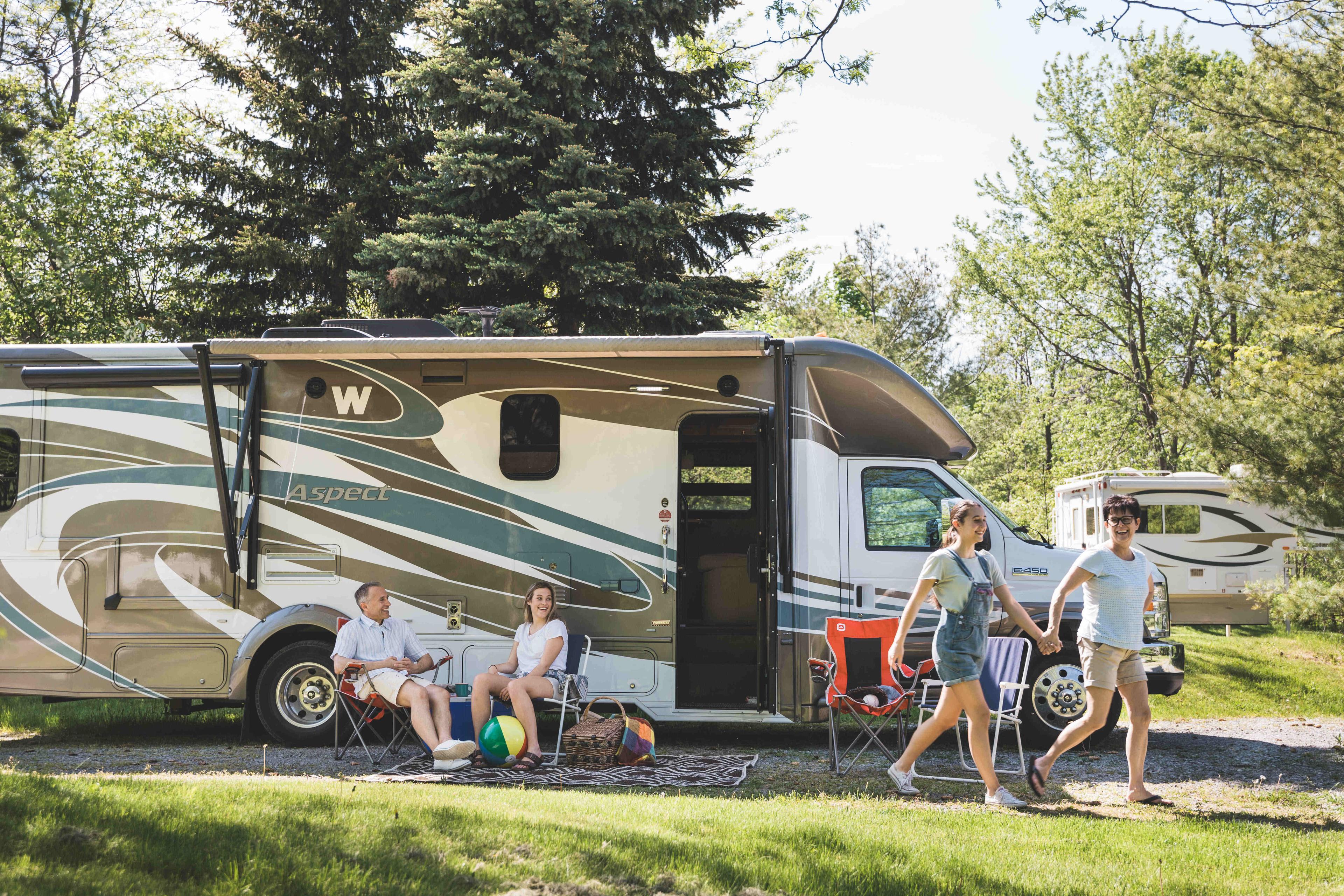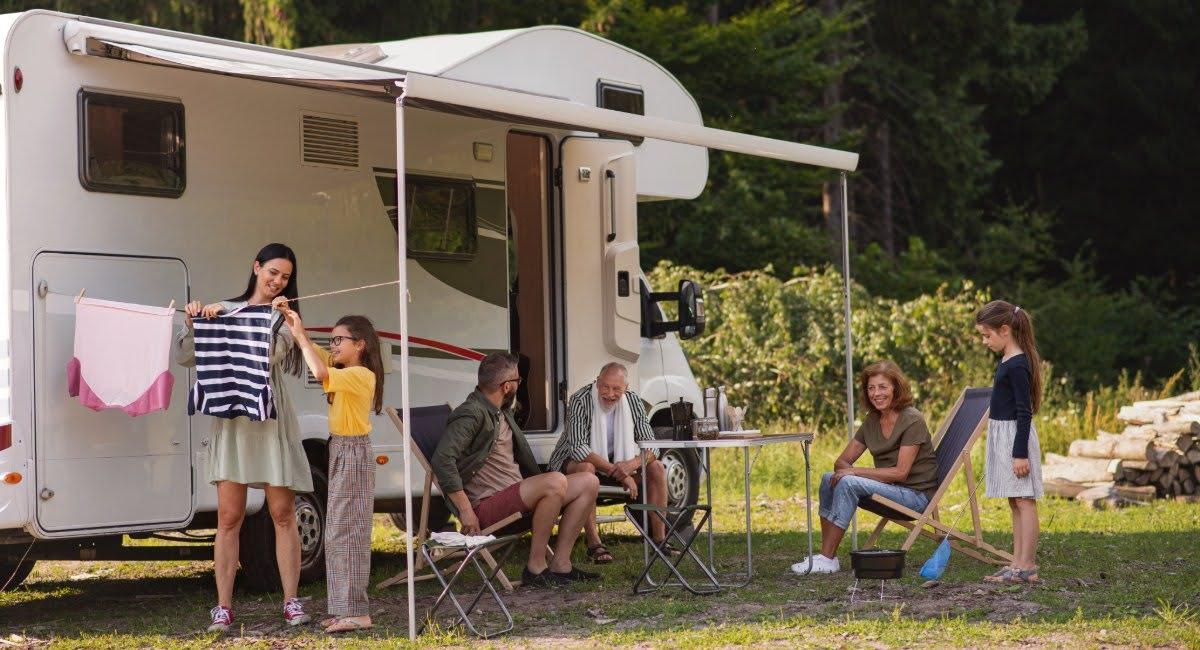Jan 18, 2022
Living in a Class C RV: What You Need to Know in 2026
Living in a Class C RV: What You Need to Know in 2026
Discover everything about living in a Class C RV full-time. From costs to maintenance tips, pros/cons, and preparation advice for your RV lifestyle.
Common questions
Blog Post
Education

TL;DR: Ready to trade your zip code for an endless horizon? Class C RVs hit that sweet spot between comfort and adventure—think of them as your basecamp on wheels. These versatile motorhomes cost $40,000-$300,000+, sip fuel at 9.5–15 mpg, and need $1,000-$3,000 yearly for upkeep.
With 3.1 million Americans already calling RVs home, Class C motorhomes offer the most approachable entry into full-time road life. The real prep work? Mastering minimalism, budgeting for proper insurance ($800–$4,000 depending on use and rig value), and getting cozy with some basic maintenance know-how.
How Does Living in a Class C RV Compare to Other RV Classes?
Class C motorhomes are the Goldilocks of the RV world—not too big, not too small, but just right for most adventurers ready to call the road home.
Imagine navigating a tight campground road at sunset, and that massive Class A in front of you is stuck trying to make a three-point turn. Meanwhile, you glide past in your Class C, snagging the best spot with the lakefront view. That's the Class C advantage in a nutshell.
These motorhomes typically stretch 21-32 feet long —manageable enough that you won't break into a cold sweat backing into a campsite, yet spacious enough that you won't feel like you're living in a sardine can. Some Super C models can reach 35–38 feet, but these are heavier-duty and more expensive. Built on familiar truck chassis (Ford, Chevy, or Mercedes-Benz), they handle like the pickup truck you're probably already comfortable driving.
That distinctive "cabover" bump above the cab? It's not just for show. This signature feature gives you extra sleeping space or storage with weight capacities up to 750 pounds—perfect for kids, guests, or that outdoor gear collection you can't leave behind.
Understanding the differences between RV classes can help you choose the right fit for your lifestyle and insurance needs.
What Makes Class C RVs Perfect for Road Life:
- Length: 21-32 feet (fits in spots Class As can only dream about)
- Sleeping capacity: 4-10 people, depending on your floorplan adventures
- Fuel economy: 9.5–15 mpg (your wallet will thank you)
- Chassis: Truck-based platforms (Ford E-Series, Mercedes Sprinter)
- Price range: $40,000-$300,000+ (there's truly one for every budget)
According to the RV Industry Association, the RV industry has an overall annual economic impact of $140 billion to the US economy, supporting nearly 680,000 jobs—proof that the RV lifestyle isn't just a trend, it's a movement.
What Are the Real Pros and Cons of Class C RV Living?
Class C life is like that perfectly broken-in pair of hiking boots—incredibly comfortable once you know what you're getting into, with a few quirks you'll learn to love (or at least tolerate).
The Sweet Spots of Class C Adventure:
Better Fuel Economy: Class C RVs often get better fuel economy than larger Class A RVs, especially diesel pushers—but it varies by size and engine type.
Easier Maintenance: The gasoline engine is right up front, not hidden under the bedroom floor like diesel pushers, meaning you'll find more facilities that can work on them. Handy with a wrench? Many DIY-savvy owners can handle basic maintenance themselves.
Campsite Accessibility: Smaller motorhomes can slip into boondocking spots and state park campsites that bigger rigs can only admire from the road.
Family-Friendly Design: Class C models are actually more family-friendly than Class A motorhomes, with features like fold-out couches, fold-down tables, and the cabover bed that can convert back to living space during the day.
The Challenges You'll Face:
Higher Repair Costs: Most RV owners report repair expenses between $500-$2,000 per service appointment, with annual maintenance typically ranging from $1,000-$3,000 depending on usage and age. And that's just the cost of keeping your adventure machine road-ready.
Space Limitations: Even the roomiest Class C will feel cozy compared to a traditional home. Learning to live with less isn't just a lifestyle choice—it's survival.
Insurance Complexity: Full-time RV insurance runs $1,500-$4,000 yearly because insurers treat your rolling home differently than weekend warriors. It's specialized coverage for a specialized lifestyle.
How Much Does It Actually Cost to Live in a Class C RV Full-Time?

Let's talk numbers without the sugar-coating—because nothing kills the RV dream faster than financial surprises six months down the road.
Your Initial Investment:
- New Class C: $50,000–$300,000+ (features and size vary widely; newer models often include modern tech and extended warranties)
- Used Class C: $7,000–$150,000+ (age, condition, mileage, and previous maintenance play major roles)
Annual Operating Costs:
- Full-Timer Insurance: $1,200–$3,500/year (depending on state, rig value, and insurance provider).
- Maintenance & Repairs: $1,200–$4,000/year (includes regular servicing, tires, and occasional repairs)
- Fuel Costs: Highly dependent on region and travel habits; at roughly 9.5–14 mpg; annual fuel costs range $3,000–$6,000/year depending on style of travel and fuel type (diesel tends to be pricier but more efficient)
- Campground Fees: $35–$85/night at popular spots; many travelers offset costs with free boondocking or lower-priced state parks averaging $15–$30/night
Here’s the Bottom Line: Including storage (if needed), loan or financing payments, insurance, maintenance, fuel, and those spontaneous road trips (say, a quick run to Yellowstone or a weekend near the coast), your annual costs typically range from $18,000 to $45,000. Seems like a lot? Consider that traditional housing costs (rent, utilities, property taxes), can easily exceed this, without the benefit of a constantly changing backyard view.
What RV Insurance Coverage Do Full-Timers Actually Need?
Here's where things get interesting—your Class C isn't just a vehicle anymore, it's your home, office, and storage unit all rolled into one. Your insurance needs to catch up to that reality.
Think about it: if someone breaks into your house, you call homeowner's insurance. If someone breaks into your RV that happens to BE your house, regular auto insurance might not cut it. Some standard RV policies may include limited personal property coverage, but full-timer or RV-specific insurance offers better protection for valuables and living situations.
Essential Coverage for Your Rolling Home:
Full-Timer Liability Coverage: When you live in your RV six months or more per year, you need additional coverage for liability and medical expenses.
Personal Property Protection: Everything you own is now on wheels. Your laptop, that vintage guitar, your grandmother's quilt—comprehensive coverage becomes critical for protecting against theft, vandalism, and weather damage.
Emergency Expense Allowance: If your transmission decides to take a vacation in the middle of nowhere, this coverage handles your hotel, rental car, and meals while you're stranded.
What's Not Covered:
Normal wear and tear, mold, fungi, or rot typically don't get coverage—except when mold results from water damage. Basically, maintenance is on you, but disasters are on them.
Pro Tip: Hunt down insurers who actually understand the RV lifestyle. Getting Class C motorhome insurance from specialists who know the difference between recreational and full-time coverage can save you headaches (and money) down the road.
How Do You Prepare for the Minimalist RV Lifestyle?
Welcome to the ultimate game of Tetris, where every item needs to earn its place and multi-purpose is the magic word.
Here's the thing nobody warns you about: moving from a house to a Class C isn't just downsizing—it's reimagining what you actually need versus what you think you need. Even the most spacious Class C laughs at the idea of a walk-in closet, so you'll need to become a master of storage creativity.
Smart Downsizing Strategies:
Choose Multi-Purpose Items: Instead of bringing that rice cooker, opt for a multi-purpose pressure cooker like an InstantPot that serves many cooking functions. You want items that are small and versatile—the more purposes an item can fulfill, the less clutter you'll have.
Essential vs. Convenient: While you can learn to live with less, you can't skimp on essentials like nonperishable food, medicine, batteries, flashlights, blankets, jackets, tarps, and basic tools.
Kitchen Mastery:
- Ditch the full knife set for one quality chef's knife
- Prioritize tools that actually make cooking easier—good spatulas beat fancy gadgets
- Choose appliances that serve multiple functions
The beautiful part? You'll discover you can live quite happily with way less than you thought.
What Maintenance Should You Expect with a Class C RV?
Think of maintenance as the price of admission to the adventure club—$1,000-$3,000 annually keeps your rolling home happy and you stress-free.
Here's the reality: your Class C is basically a house, a car, and a utility system all mashed together into one complex machine. That means maintenance isn't just about oil changes—though those matter too.
Class C motorhomes must meet Federal Motor Vehicle Safety Standards established by NHTSA, ensuring your rig is road-ready and safe for the adventures ahead.
Routine Maintenance Costs:
- Oil Changes: $50-$100 every 3,000-5,000 miles
- Tire Rotations: $20-$50 every 6,000-10,000 miles
- Brake Inspections: $30-$50 annually
- Battery Maintenance: $100-$300 for replacements
- HVAC/Plumbing/Electrical: $200-$500 for annual system checks
When Things Go Sideways:
The good news? Most common repairs—sealant leaks, brake work, tire replacements, plumbing hiccups, and electrical gremlins—typically run under $1,000 per fix. It's not fun, but it won't bankrupt your wanderlust fund.
High Cost Alert: The two biggest maintenance investments? New tires can hit $1,200–$2,500 for a full set of six (depending on size and brand), whereas high-end tires can cost up to $3,200. Suspension upgrades add another chunk, but both are important investments in safety and comfort.
DIY vs. Professional Service:
Here's where Class C shines—that engine sitting right up front means you can actually see what you're working with. If you're comfortable with basic automotive work, you might be able to handle some repairs yourself. If not, most regular auto shops can help since you're not dealing with exotic diesel systems buried in impossible places.
The key? Stay ahead of problems with regular check-ups. An ounce of prevention beats a pound of roadside assistance calls.
Why Should You Test RV Living Before Going Full-Time?
Look, we get it. You've watched the Instagram videos, read the blogs, and you're ready to sell everything and hit the road tomorrow. But here's some friendly advice: pump the brakes for just a minute and give yourself a chance to learn what you don't know yet.
Smart Testing Strategies:
Start with Campground Living: Rent a Class C for a week or two and post up at a decent RV park. This isn't glamping—this is research. You'll quickly discover whether you're the type who thrives with neighbors 20 feet away or if you need more solitude than a crowded campground offers.
Key Questions to Answer During Testing:
- What amenities can you live without, and which ones are non-negotiable?
- How much power do you actually burn through in a day? (probably more than you think)
- What about water? You might be shocked how fast those tanks empty
- Can you handle driving this thing in real-world conditions—not just the dealer's lot?
Community Benefits: One thing you can't fake is the RV community culture. Full-timers often rave about the connections they make—people from completely different backgrounds united by a shared love of adventure and freedom. But campground living isn't for everyone, and that's okay to discover early.
If you're sold on the idea, check out our guide to the best RVs for full-time living to compare how Class C stacks up against other options.
Remember: your RV gives you the ultimate freedom—including the freedom to park somewhere else if your current spot isn't working out. Test that flexibility while you're still figuring out what "home" means to you.
Is It Time to Make the Leap into Class C RV Living?
You’ve done the research, weighed the pros and cons, and maybe even test-driven a few rigs. If the idea of full-time Class C RV living still lights you up, it might just be the right time to make the leap. Whether you’re seeking adventure, downsizing for a simpler lifestyle, or chasing warmer winters, a Class C motorhome offers a flexible, approachable way to take your life on the road.
But before you turn the key and set your sights on the horizon, make sure your insurance is built for the lifestyle you’re stepping into. From protecting your personal belongings to covering you in case of accidents or emergencies, Roamly understands that your RV is more than a vehicle—it’s home.
Ready to turn your Class C dreams into reality? Get a fast, custom RV insurance quote from Roamly and hit the road knowing your rolling home is properly protected. Let's get you covered so you can get going!
Most Class C RVs can be driven with a standard license. However, if the RV's gross vehicle weight exceeds 26,000 lbs (rare for most Class Cs), some states have specific requirements. Always check your state’s DMV rules.
Plan for $1,300-$3,500 monthly, including RV payments, insurance ($125-$335), maintenance ($85-$250), fuel, and campground fees. Costs vary significantly based on travel frequency and campground preferences.
Well-maintained Class C RVs typically require $1,000-$3,000 in annual maintenance and repairs. Major breakdowns are less common with proper preventive maintenance, but budgeting for unexpected repairs is essential.
Underestimating storage limitations and bringing too much stuff. Start with essentials only—you can always buy items on the road, but getting rid of excess belongings while traveling is challenging.
No. Full-timers need specialized RV insurance that treats your RV as a primary residence, typically requiring coverage for 6+ months of annual use. Regular auto policies won't cover personal belongings or provide adequate liability protection.
Roamly Insurance Group, LLC ("Roamly") is a licensed general agent for affiliated and non-affiliated insurance companies. Roamly is licensed as an agency in all states in which products are offered. Roamly license numbers. Availability and qualification for coverage, terms, rates, and discounts may vary by jurisdiction. We do not in any way imply that the materials on the site or products are available in jurisdictions in which we are not licensed to do business or that we are soliciting business in any such jurisdiction. Coverage under your insurance policy is subject to the terms and conditions of that policy and is ultimately the decision of the buyer.
Policies provided by Roamly are underwritten by Spinnaker Insurance Company, Progressive Insurance Company, Safeco Insurance Company, Foremost Insurance Company, National General Insurance, Mobilitas Insurance Company, and others.
Connect
© 2026 Roamly All rights reserved.
